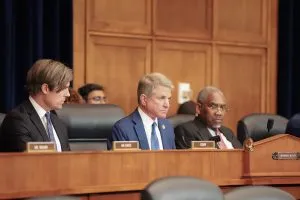Chairman McCaul Delivers Remarks at Subcommittee Hearing on Houthi Terrorist Threat
Washington, D.C. – Today, House Foreign Affairs Committee Chairman Michael McCaul delivered remarks at a Subcommittee on the Middle East, North Africa, and Central Asia hearing entitled, "Iran's Proxy in Yemen: The Houthi Threat to Middle East Stability, Global Shipping, and U.S. Servicemembers." In his opening remarks, Chairman McCaul highlighted how the attacks committed by Iranian proxies across the Middle East, including Houthi terrorists in the Red Sea and the Gulf of Aden, fuels instability in the region, putting lives and the global economy at risk. Chairman McCaul also underscored the urgent need for the Biden administration to restore deterrence.
– Remarks as Delivered –
Since Hamas' brutal October 7 attack on Israel, Iran's proxies throughout the Middle East have launched assault after assault on the United States and our partners.
The Houthis in Yemen have launched dozens of attacks against international shipping in the Red Sea and Gulf of Aden.
These ongoing, Iran-backed attacks threaten a wide array of international interests.
They are driving up shipping costs, increasing insurance rates, and disrupting global supply chains.
The Houthis' latest escalation is a symptom of the international community's failure to address the Houthi threat.
For years, the Houthis have benefited from support provided by Iran and Hezbollah, which transformed this group of ragtag guerrillas into a fighting force with the capacity to destabilize the entire region and disrupt global trade.
But the world has consistently downplayed this threat and Iran's role in enabling it.
The Biden administration's policies have emboldened the Houthis at the expense of our regional partners.
By projecting weakness on the world stage, this administration has invited aggression.
While Iran was smuggling weapons to the Houthis, this administration was busy lifting terror designations and cutting off support to Saudi Arabia amid Houthi cross-border fire.
Appeasement has no place in U.S. foreign policy, but that is exactly what has occurred in Yemen and beyond.
Even now, this administration continues to treat the Houthis with kid gloves.
They are promoting a U.N. "peace deal" that would legitimize the Houthis' violent, autocratic rule over millions of innocent Yemenis, and secure Iran's foothold in Yemen.
And despite re-designating the Houthis as a "Specially Designated Global Terrorist" organization, President Biden has refused to use the strongest tool at his disposal, and that is the "Foreign Terrorist Organization" designation that they had prior to this administration.
I think its time to recognize them for who they are, and re-designate them as a Foreign Terrorist Organization.
There can be no denying Houthis are terrorists and present a real threat.
As attacks by the Houthis continue, urgent action is clearly needed to deter them and defend U.S. national interests.
I look forward to this hearing, and to hear how we can work with our allies and partners to protect our service members and the global economy, as well as steps to promote stability in the region.
Nobody wants war. Nobody wants an escalation. Nobody wants a war with Iran, but history teaches us that if we do not act in strength–but rather weakness–we will invite aggression, conflict, and war. It's as old as Neville Chamberlain and Hitler. Churchill talked about appeasement. Reagan talked about peace through strength. If we do not project strength, we will get conflict and war.
160 attacks on our soldiers in Iraq and Syria, and then Tower 22 in Jordan, with little response. It only begets more violence. Deterrence is necessary to promote peace in the region.
###
